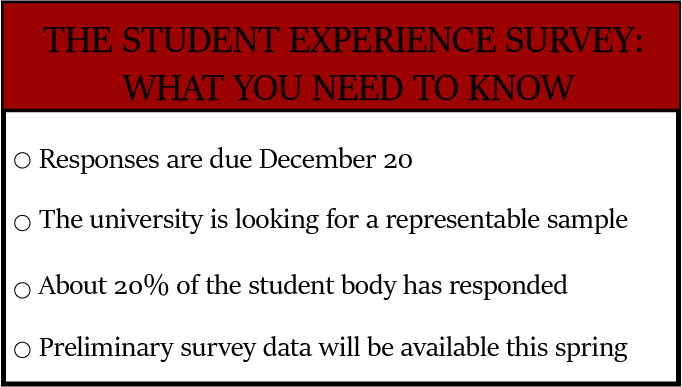Boston College launched its first Student Experience Survey in October in response to demands made by the students who organized the Silence is Still Violence demonstrations last year. The survey can be taken until Dec. 20—so far, about 20 percent of the student body has taken part, according to interim Vice President of Student Affairs Joy Moore.
“I think it’s been great, because any time that you have students who are as busy as our BC students are take out the time to do a voluntary survey, I think it’s a good thing … especially too that it’s crunch time with finals coming,” she said. “They’re taking the time to get their voices heard—that’s what we want.”
Michael Osaghae, chair of the AHANA+ Leadership Council and MCAS ’20—who was involved in the creation of the survey—said that he recognizes that students are busy, but that he’d like to see the response rate at 100 percent.
“This is a unique opportunity that doesn’t come around often,” he said. “Students are being asked by the University, ‘What do you like about BC? What do you not like? What do you want to see change? What do you want to see continued?,’ and so I think us as a student body should capitalize on that.”
Many different factors determine whether the survey can be considered valid, according to Stephanie Chappe, the lead research analyst at BC. The University examines how representative the survey is, to see if the respondents are reflective of the general BC population and make sure that no one group is over or underrepresented, and runs analyses to determine whether the smaller groups on campus are represented by a large enough sample size to make valid statements about them.
“Where we are right now, we have that—it’s a representative sample so far,” said Kathryn Mackintosh, the associate director for Institutional Research Operations. “We have big enough cell sizes in the major categories. But that being said, we always want it to be higher—so we’d love for more participation to see that number go up over the next couple of weeks.”
Osaghae pointed out that the survey gives students a chance to reflect on their BC experience. He noted that there were many things related to what he wanted to get out of his BC experience that he didn’t think about until he took the survey.
Moore emphasized that this is an opportunity for students to be heard. BC students often talk about how they want to see change at their school and now is the time for them to articulate those opinions.
“It’s also the time to just be able to share what your experiences have been like,” Moore said. “And some people have great experiences, some people’s experiences, maybe not so great. And that’s okay, too, right? We want to hear the whole range of experiences, because that’s the student body that we have—it’s a range of student perspectives and ideas. And so we’re trying to get as much of that as we can on the table.”
Osaghae said that he hopes this survey enables the University to pursue some of the things students have been advocating for over many years.
“There’s a legacy of student activism where students have fought to be heard and they weren’t heard, and I think the survey’s an accumulation of that—the work and advocacy of so many other people that haven’t had the opportunity to let their voice be heard in such a large platform,” he said.
To incentivize students to take the survey, the University is giving a $250 Amazon gift card to one student and $50 Amazon gift cards to five students who complete the survey by Dec. 14.
“I’m excited to see what the results do show and then to be able to start working on some of the things that come out of the survey by way of suggestions or recommendations that students might have made on the survey,” Moore said. “Of course, they’ll probably be a large list of things, and you can’t do everything at once. But you can prioritize and start to get some things done and really take action.”
Moore said she hopes the survey will allow students to understand that they can make a difference by sharing their perspectives and opinions about their BC experience.
“It allows us to look at different aspects of the BC experience and see where we need to do some work and tweak things and to make it better for those students who are coming next,” she said. “And that can be big things all the way to, you know, ‘Are they still serving mozzarella sticks at Late Night?’”
“If you have all good things to say about BC, say it. If you have bad things to say about BC, say it,” Osaghae said. “This is a holistic measurement, so hopefully that’ll allow us to sit back, reflect the results, and move forward as community.”
Featured Image by Ikram Ali / Heights Editor



















